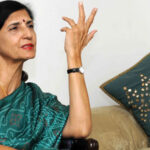THE sinister shadow of urbanisation, industrialisation, and atomisation of families has not only deprived the elders of the societal reverence, traditional family love and care but they are being increasingly neglected and abused. The problem would exacerbate and reach gargantuan proportion with the growing size of elderly population, which was 20 million in 1951, 57 million in 1991, 104 million in 2012 and would be over 300 million by the year 2050. While successive governments have devoted greater part of their focus on shelter, food and healthcare, especially maternal and child health, the healthcare of the aged continues in a state of terrible neglect. The deprived, neglected, abused and abandoned elders whose number continues to swell, suffer unattended from serious geriatric health and cognitive disorders. Many senior citizens suffer from the most common form of dementia-Alzheimer’s disease, a silent tormentor.
Old age, promised as ‘the best of yet to be portion of life, the last of life, for which the first was made’, is being viewed today, at best, a poetic fantasy, an ideal state of some hoary past when elders were venerated and considered a fount of wisdom. To wit, despite scriptural injunction that ‘an assembly is incomplete without elders’ and the promised multiple benefits that flow from the service of the elders, the condition of elders is aggravating due to a host of factors. Worse, the condition of aged women, who live longer and alone abandoned by their families, is all the more painful. Extremely concerned with the increasingly unbearable plight of elders, Bhartruhari Mahtab brought a legislative proposal in the Lok Sabha by piloting the Senior Citizens (Provisions of Geriatric and Dementia Care) Bill, 2014 which generated tremendous interest cutting across political fences.
As is the fate of Bills introduced by private MPs, (surprisingly all MPs other than Ministers are considered ‘private’ under Rules of Procedure of Parliament), the Bill was talked out. But undaunted, given his unflinching commitment to address the mounting problems of the aged and his indefatigable resolve, Mahtab took upon himself, despite his awful legislative preoccupation (as he attends the House regularly and participates in almost all the debates), to document the appalling conditions of elders in India-the unbearable agony of the abused aged persons, neglected both by the families and the state.
 The result is his book, Walking into Twilight with Dignity, recently released by Lok Sabha Speaker Sumitra Mahajan. Besides, Mahtab has made an in depth comparative study and analysis of the obtaining healthcare system in the US, Canada, major countries of Europe, Australia, Japan and the some of the neighbouring countries.
The result is his book, Walking into Twilight with Dignity, recently released by Lok Sabha Speaker Sumitra Mahajan. Besides, Mahtab has made an in depth comparative study and analysis of the obtaining healthcare system in the US, Canada, major countries of Europe, Australia, Japan and the some of the neighbouring countries.
THOUGH the Indian scriptures eloquently refer to the manifold benefits that accrue to society by venerating elders, there is increasing neglect with recurrent instances of abuse of elders, some reported while many suffer in isolated silence. Responding to a PIL, the Supreme Court in April 2016 directed the GoI to prepare a road map providing to the senior citizens (10.38crore) basic amenities like shelter, food and healthcare.
Senior citizens suffer from many geriatric disorders and the author citing empirical studies, writes that Alzheimer’s is the most common form of dementia that affects a large section of population in India and around the world. Geriatric diseases and disorders too have stages, which if not attended to in time, aggravate leading to more acute and irreversible conditions.
India is in a phase of rapid demographic transition. By the year 2050, the number of aged persons would rise to about 324 million. This is a clear pointer that the much acclaimed youthful demographic bulge of India would be replaced in a decade or so by bald-wrinkled-ailing Indians, leading to a serious public health crisis. With increased life expectancy, disintegration of families, erosion in filial ties and lack of professional geriatric healthcare, the aged become vulnerable to a whole array of diseases and age-induced infirmities.
Mahtab, a five-term consecutively elected member of Parliament, rightly forewarns and cautions that the Indian healthcare system needs drastic reorientation while stressing the importance of family and society in the care of the aged. Considered an outstanding legislator by many, Mahtab advocates wholesale reforms through state intervention by erecting a sound legal and financial framework and a robust healthcare system well designed and equipped to address geriatric disorders so that when the children of today become aged, they lead a life of secure and dignified existence in their twilight years.
It must be realised, as Prof. Saugata Roy, participating in the debate on the subject in Lok Sabha said, ‘the world is also for the aged people… the vice of the modern chattering class is that they do not look after their parents’. The care of the aged is not only a responsibility of the government but also of society as a whole and, therefore, needs to be addressed collectively, comprehensively and in a sustained manner.
The author is Additional Secretary, Lok Sabha.
















































